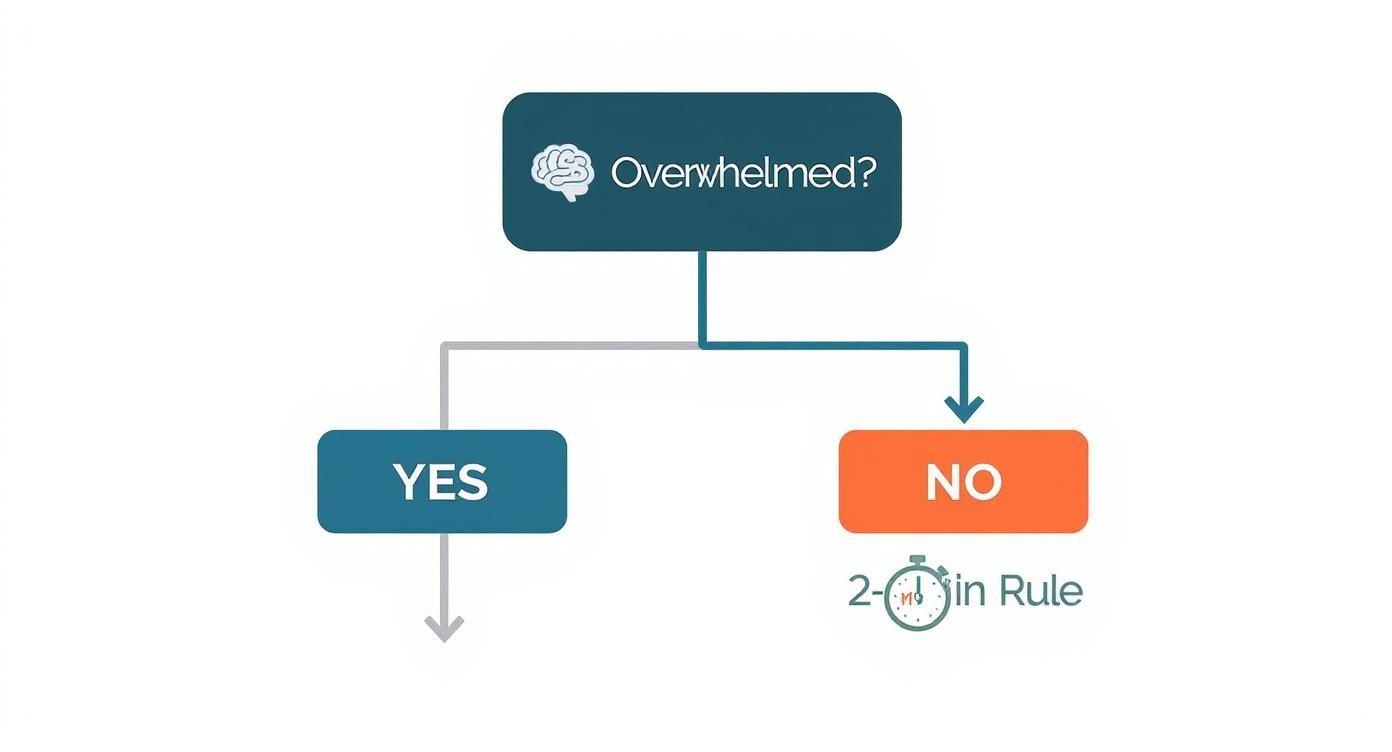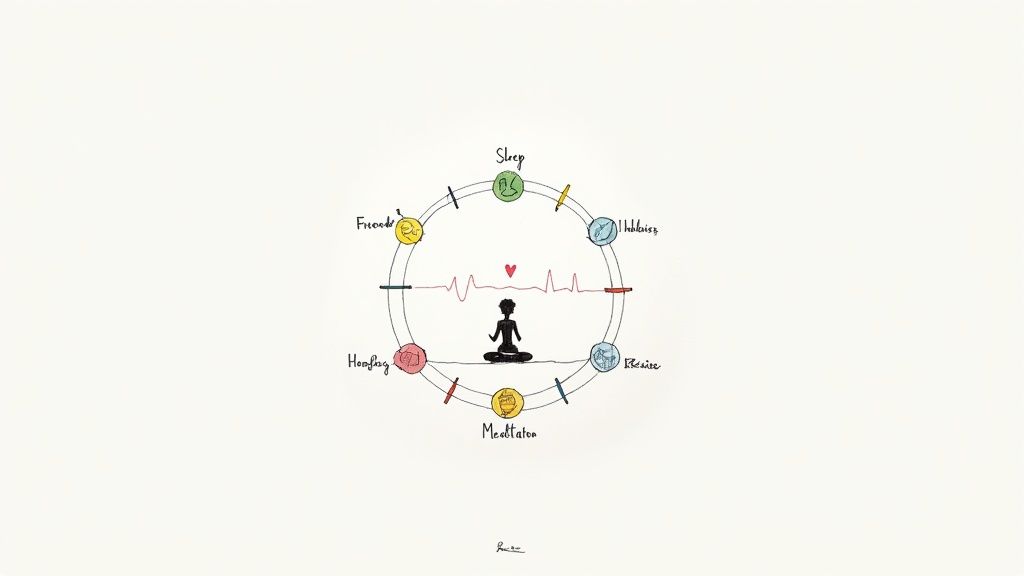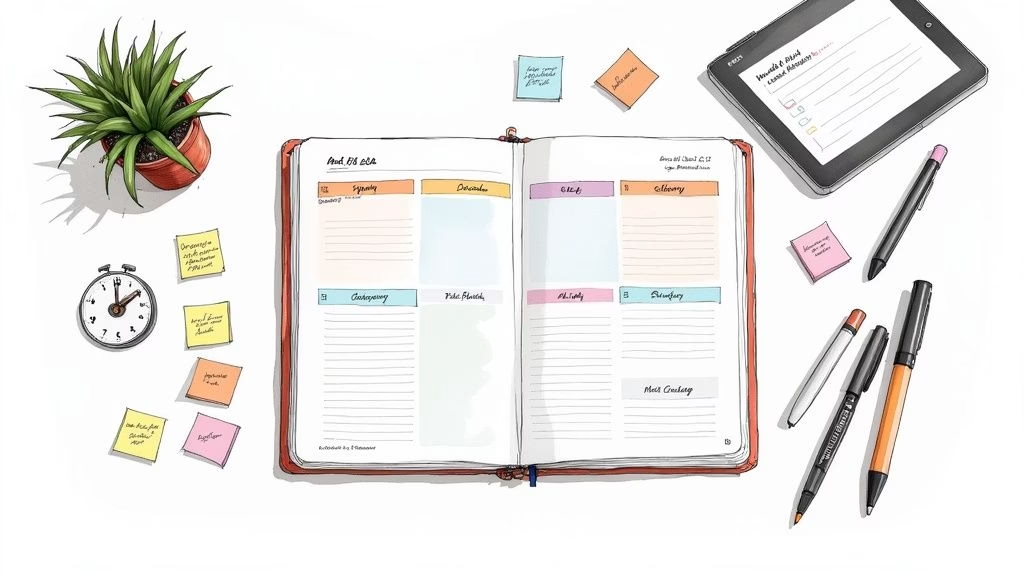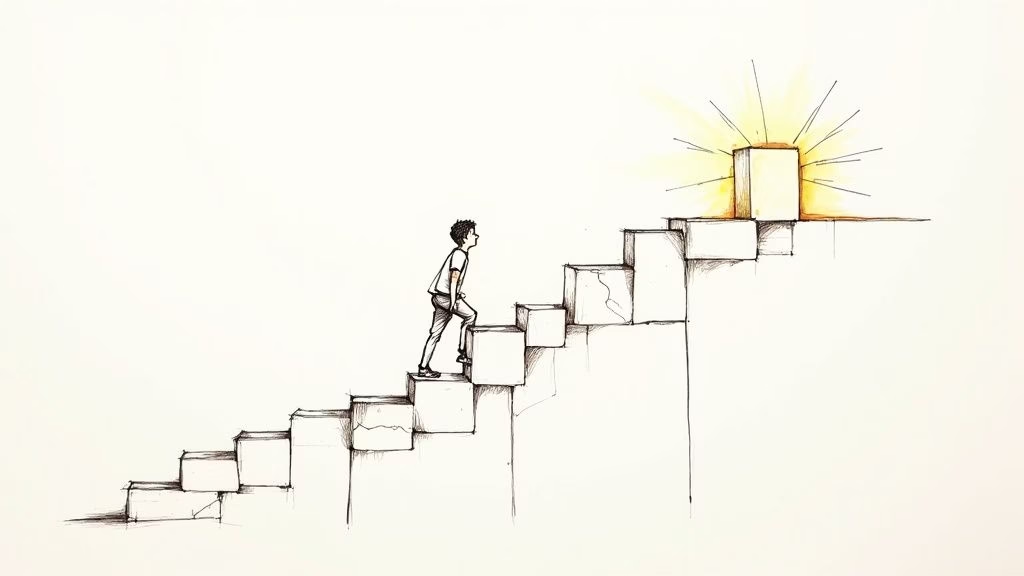For a teenager, learning to manage time isn't just about finishing homework. It's about creating a flexible system that actually works—one that makes space for school, friends, and their own mental health without causing a total meltdown. The goal isn't just to check off boxes on a to-do list, but to build skills that help them decide what’s important, handle digital distractions, and find some balance. This guide offers practical strategies, parenting tips, and mental health resources to support teens in mastering this crucial life skill.
Why Old-School Time Management Fails Modern Teens
Handing a teenager a paper planner to solve their procrastination problem is like trying to fix an iPhone with a hammer. It’s the wrong tool for the job. Those old-school methods were built for a world without a constant stream of notifications, an endless scroll on social media, and the always-on pressure of being connected.
Today’s teens are juggling way more than just homework and chores. They’re navigating a messy mix of school deadlines, social plans, and digital demands that are all screaming for their attention at the same time. The simple act of sitting down to study becomes a battle against a device that’s literally engineered to keep them hooked. This isn't a character flaw; it's the environment they've grown up in.
The Digital Dilemma
Let's be real: a huge chunk of a teen's day is spent online. The average teenager is now staring at a screen for more than 7 hours and 22 minutes per day. That's nearly half of their waking hours. With that much time gone, it’s no wonder there’s barely any left for homework, hobbies, or just hanging out with friends face-to-face.
As these digital demands get bigger, so do the worries about their mental health. Studies are starting to connect all that screen time with higher rates of anxiety and depression in teens. You can discover more insights about teen screen time and how it shapes their daily lives.
This is where a lot of parents get it wrong. Trying to force a rigid, offline-only schedule on a teenager isn't just going to fail—it's going to start a fight. It completely ignores the world they live in and doesn't give them the skills they need to actually manage it.
Time management for today's teens isn't about getting rid of technology. It's about teaching them how to be in control of it, so it doesn't end up controlling them. The aim is to use it with purpose, not to avoid it completely.
To really get a sense of where the time goes, let's break it down.
A Modern Teen's Daily Time Breakdown
Here's a realistic look at how a typical 24-hour day can get sliced up, showing the constant tug-of-war between their digital lives and their real-world responsibilities.
| Activity Category | Average Daily Time | Impact on Time Management |
|---|---|---|
| School & Homework | 6-8 hours | The core responsibility, but often interrupted by digital distractions. |
| Screen Time (Social Media, Gaming, etc.) | 4-7 hours | The biggest variable and the primary source of time loss and distraction. |
| Sleep | 6-8 hours | Often sacrificed for late-night screen use, impacting focus and mood. |
| Socializing (In-Person) | 1-2 hours | Competing directly with online interactions, making face-to-face time a lower priority. |
| Family & Chores | 1-2 hours | Essential tasks that often get pushed to the back burner when time feels scarce. |
| Hobbies & Extracurriculars | 1-2 hours | Important for well-being, but can be the first things to go when teens feel overwhelmed. |
Seeing it laid out like this makes it clear: there isn't much wiggle room. Every minute spent scrolling is a minute taken from something else, whether it's sleep, homework, or just downtime.
Supporting Young Men on Their Journey
For teen boys, these challenges can feel even heavier. There's often this unspoken pressure to be tough and handle everything on their own. They might be drowning in stress but feel like they can't ask for help because it's a sign of weakness. Struggling young men often internalize their challenges with motivation and procrastination, leading to a silent battle with their mental health.
This is why having the right support is so important.
Organizations and men's groups for young men can offer mentorship and a community where it's safe to be vulnerable. In these spaces, learning to manage their time becomes part of a bigger journey—one of self-awareness and personal responsibility. These are the skills that stick with them long after they've graduated, helping them build a foundation for success and mental wellness. A simple tool like a meditation guide for teens can also be a game-changer for managing stress and staying focused.
Taming Procrastination and Finding Real Motivation
Let's be honest, procrastination isn't just laziness. For a teenager, it's often a defense mechanism. It’s a shield against the feeling of being totally overwhelmed by a huge school project, the fear of failing, or just a complete disconnect from whatever task is sitting in front of them. Nagging doesn't work here. The real way forward is with practical, low-effort strategies that make it easy to just start.
This isn't a rare problem—it's everywhere. Research shows a staggering 82% of people, teens included, don't use any kind of formal time management system. That lack of structure hits school performance hard, with studies revealing that 75.5% of students grapple with procrastination.
Think about it: the average person gets distracted every three minutes and then needs another 23 minutes to get back on track. It’s no wonder a homework session can feel like spinning your wheels.
Breaking the Cycle with Simple First Steps
Instead of staring up at the entire mountain of work, the goal is to get them to take one small step. That's it. Small, consistent actions are what build momentum and confidence, and those two things are the ultimate enemies of procrastination.
Here are a few simple but incredibly effective methods to try:
- The Two-Minute Rule: If something takes less than two minutes, just do it. Now. This could be firing off a quick email to a teacher, putting clothes away, or clearing off their desk. It’s a simple trick that stops the small stuff from piling up and becoming overwhelming.
- Time Blocking: A vague goal like "study for history" is easy to ignore. Instead, get specific. Block out a chunk of time in a calendar: "4:00 PM – 4:45 PM: Review History Chapter 3." This creates a real commitment and protects that time from other distractions.
- The Pomodoro Technique: This classic is a game-changer for big, daunting tasks. The idea is to work in a focused 25-minute sprint, then take a 5-minute break. After four of these cycles, take a longer break. It breaks down marathon study sessions into manageable, bite-sized pieces.
How Parents Can Nurture Motivation That Lasts
Your role here is huge, but it's about fostering intrinsic motivation—that internal drive to do something because it’s personally rewarding. This is so much more powerful than relying on external pressures like grades or the threat of punishment.
Focus on praising the effort, not just the outcome. Saying, "I saw how hard you worked to figure out that math problem," is way more impactful than, "You got an A." It reinforces the value of persistence, a skill they’ll carry with them for life.
Try to connect their schoolwork to their genuine interests. Does your teen love video games? Talk about the storytelling in their English class or the physics engines at play in science. When they see how school applies to their passions, the work suddenly feels relevant, not just like a chore. For a deeper dive into overcoming these hurdles, check out our guide on how to stop procrastinating.
Helping them set small, achievable goals is another powerful tool. A goal like "finish one paragraph of my essay" feels way less intimidating than "write the whole essay." Each small win builds their confidence, proving to them that they're capable of tackling bigger challenges. That's how you slowly turn the tide against procrastination for good.
Find the Right Time Management Tools for Your Teen
A rigid, one-size-fits-all approach to time management is usually the first one to get abandoned. The real secret is helping your teen find a system that actually clicks with their personality and lifestyle, whether that’s a high-tech app or a simple notebook.
The right tool isn’t about control. It’s about giving them ownership over their schedule and their life.
Analog Versus Digital Systems
Some teens are already wired for digital. If they live on their phone, leaning into that can be a game-changer. Apps like the Taskignite app offer a modern approach to productivity, while old standbys like Google Calendar are fantastic for visualizing the week ahead. Tools like Todoist are great for breaking down intimidating projects into small, concrete steps.
But don’t discount the power of pen and paper. Seriously.
For some teens, the physical act of writing something down makes it stick. It cements the commitment in a way a screen just can't. A simple bullet journal offers total creative freedom, letting them design a system from scratch that combines calendars, to-do lists, and personal goals all in one place.
- Digital Tools (Google Calendar, Todoist): Best for tech-savvy teens. They offer automatic reminders, are great for sharing group project timelines, and can be accessed from any device.
- Analog Tools (Bullet Journals, Planners): Ideal for visual thinkers and anyone who gets a little dopamine hit from physically checking off a task. Plus, they’re free from the endless notifications and distractions that come with a screen.
The only way to know what works is to experiment. Encourage your teen to try one system for a couple of weeks. If it’s not working, talk about why and pivot to something else. No judgment, just problem-solving.
Master Prioritization with the Eisenhower Matrix
One of the biggest hurdles for any teen (and most adults, let's be honest) is deciding what to tackle first. When everything feels urgent, it's easy to get paralyzed.
The Eisenhower Matrix is a simple but incredibly powerful framework for teaching prioritization. It helps teens visually sort tasks based on urgency and importance—a critical step to improve organizational skills and quiet that feeling of being completely overwhelmed.
This simple decision-making tool is the perfect antidote to procrastination when that "I don't even know where to start" feeling hits.
As the infographic shows, it’s all about breaking things down into tiny, actionable steps. That’s the key to getting started.
A task like "study for finals" is paralyzing. It’s too big. But "review chapter one notes for 20 minutes" feels achievable. This framework helps your teen focus on what truly matters—like finishing that urgent history project—instead of getting bogged down by distractions that feel important but aren't.
Conduct a Simple Energy Audit
Finally, help your teen become a student of their own energy. Are they a morning person who can crank out homework before school, or do they hit their stride after dinner?
An "Energy Audit" is just a fancy way of saying they should schedule their most demanding, high-focus tasks during their natural energy peaks. This is when they should tackle that tough math assignment or write that English essay.
Conversely, low-energy tasks—like cleaning their room, packing their sports bag, or replying to emails—should be saved for their natural slumps. This simple shift ensures they are working with their internal clock, not against it. It makes every single study session more effective, guaranteed.
The Unspoken Link Between Time Management and Mental Health
Let's be real. Effective time management isn't just about getting better grades or checking off a to-do list. It's an act of self-care. When a schedule is a chaotic mess of looming deadlines and unstructured free time, it becomes a massive source of anxiety for teens.
Building a simple, predictable routine gives them something incredibly valuable: a sense of stability and control. This is the bedrock of mental well-being.
When a teen's day is a constant reaction—scrambling to finish homework, forgetting chores, missing out on plans—their stress response is always on. A balanced schedule, on the other hand, carves out intentional space for school, rest, and connection. This small shift, from reactive to proactive, is a game-changer for their emotional health.
The Real Cost of an Unmanaged Schedule
Without a plan, downtime often defaults to screen time. The consequences are bigger than you'd think. Research shows that over 50% of teens spend at least four hours a day on screens, and a staggering 41% are on for more than eight hours.
This isn't just wasted time. It's directly linked to rising mental health issues. Among these teens, 27.1% report anxiety symptoms and 25.9% report depression. This really underscores how a lack of structure can spiral into something more serious.
These challenges can be even tougher for teens with neurodevelopmental conditions like ADHD. Getting the right kind of support is key, and targeted strategies can make a world of difference. You can find excellent resources on ADHD challenges and counselling support.
Scheduling downtime, hobbies, and social connection isn't a luxury—it's a non-negotiable part of preventing burnout. Protecting this time is as important as blocking out hours for studying.
A 2-Minute Reset: Simple Meditation for Focus
Meditation can be a powerful anchor for a stressed-out teen. It doesn't require any fancy equipment or a lot of time. Here's a simple script they can use to get started.
- Find a quiet spot. Sit comfortably on a chair or the floor. Let your hands rest in your lap and gently close your eyes.
- Focus on your breath. Take a slow, deep breath in through your nose, and let it out slowly through your mouth. Do this three times.
- Just notice. Bring your attention to your breathing without trying to change it. Feel the air moving in and out. If your mind wanders to school or friends, that's okay. Gently guide it back to your breath.
- Stay for two minutes. That's it. Just two minutes. When you're ready, slowly open your eyes.
This brief practice can be a powerful tool for calming an anxious mind and hitting the reset button. For more strategies, our guide on stress management for teens offers other practical tools.
Finding the Right Support
Figuring out how to manage time and mental wellness is a journey, and no teen should feel like they have to do it alone. It's especially important for teen boys and young men, who often feel pressure to handle everything internally, to know where they can turn for help.
Building a strong support system is key to developing emotional intelligence and resilience. The right resources can provide a safe space to navigate challenges and grow.
Here is a curated list of organizations and groups that provide direct support for teen mental wellness.
Mental Health Resources for Teens
| Resource Name | Focus Area | How to Access |
|---|---|---|
| The Jed Foundation (JED) | Mental health, suicide prevention for teens and young adults. | Online resources, guides, and help-finding tools. |
| Teen Mental Health | Education and resources on mental health for teens. | Website with articles, tools, and information. |
| A Call to Men | Promoting healthy masculinity and preventing violence. | Programs, training, and community initiatives. |
| The Man Cave | Preventive mental health and emotional intelligence for boys. | School programs, workshops, and community events. |
Finding the right fit is about what resonates most with your teen. Whether it's a community group, a specific program, or online resources, taking that first step to find support is what matters.
Support Resources for Teen Boys and Young Men
Let's be real—navigating school, friends, and figuring out who you are is a lot to handle. For teen guys, it often comes with this unspoken rulebook that says you have to be tough, keep your feelings locked down, and just power through everything on your own.
This pressure cooker environment can make it incredibly hard to find motivation or stop procrastinating. When you're busy trying to look like you have it all together, effective time management for a teenager can feel like an impossible task.
But here’s the good news: there are some amazing organizations out there creating spaces where it’s okay to be real. These are places where young men can drop the act, learn to understand their emotions, and build a genuine sense of self. They offer the kind of mentorship that builds the resilience and personal responsibility you need to actually manage your time—and your life—well.
The truth is, managing your schedule isn't just about planners and to-do lists. It's deeply tied to self-awareness. When guys learn to understand what’s really going on inside and communicate what they need, they get the clarity and confidence to take control of their future.
Mentorship and Community Groups
Joining a men's group or finding a mentor gives you a chance to learn from positive role models and connect with peers who are going through the same stuff. These groups completely dismantle the toxic idea that asking for help makes you weak.
Here are a few incredible resources to check out:
- The Man Cave: This Australian organization is all about preventative mental health and emotional intelligence. Through really engaging workshops, they help guys build the skills to handle life's challenges, create healthy relationships, and actually thrive.
- A Call to Men: While their mission is broader, they offer powerful resources that help young men break free from those restrictive stereotypes about "how to be a man." They give you a real framework for building character with integrity.
- Local Mentorship Programs: Don't forget to look in your own backyard. Most communities have programs like Big Brothers Big Sisters or other local initiatives that pair teens with supportive adult mentors. These are people who can offer solid advice on everything from school stress to life goals.
Guided Meditation and Mindfulness
Community is huge, but what you do on your own matters just as much. Building a simple mindfulness routine can be a game-changer for managing stress and sharpening your focus.
Seriously, even a few minutes of a guided meditation for teens can calm a racing mind. It makes it way easier to sit down and tackle that monster history essay or map out your week. Think of it as building a mental muscle that helps you shut out distractions and stay on track.
Common Questions About Teen Time Management
Let’s be honest, getting a teenager organized can feel like an uphill battle. It’s a process, and it’s bound to bring up some questions. Here are a few common sticking points I see with parents and teens, along with some real-world advice on how to navigate them.
How Can I Get My Teen on Board Without a Lecture?
This is the big one. The key is to ditch the commands and start a conversation. You have to make it collaborative.
Start by asking about their goals and what’s frustrating them. Frame time management not as another chore, but as a tool to get more of what they want—whether that’s guilt-free gaming time or more nights out with friends.
Let them have the driver's seat when it comes to picking the tools. If they’d rather use a slick app than a paper planner, great. If they want to design their own system in a notebook, even better. When they feel a sense of ownership over the process, they're far more likely to stick with it. Start small. Just try planning out one afternoon together and see how it goes.
What Is a Realistic Way to Manage Screen Time?
Strict, top-down bans almost always backfire. They just create more conflict and secrecy. A much better approach is to work together to create boundaries you can both live with.
- Establish a "Digital Sunset": Pick a time—say, 9 PM—when all devices get plugged in to charge somewhere outside the bedroom. This is non-negotiable for protecting their sleep, which is absolutely essential for focus and mental health.
- Use the Tools Already on Their Phone: Show them how to use their phone’s built-in "Focus Mode" or set app timers during homework. The goal isn’t to wage a war against screens; it’s to teach them how to use technology with intention.
This way, they start learning to manage their notifications instead of letting their notifications manage them.
My Teen Seems Unmotivated. How Can a Schedule Help?
That feeling of being "unmotivated" is often just a symptom of being completely overwhelmed. A huge, vague task like "study for finals" is paralyzing. Where do you even start?
A good time management system breaks that down into concrete, doable steps. "Study for finals" becomes "review chapter 1 notes for 25 minutes."
Checking off those small, manageable tasks creates a quick hit of accomplishment, and that feeling builds momentum. But here’s the crucial part: their schedule must include protected time for things they actually enjoy. When they see that handling their responsibilities directly leads to more time for fun, motivation starts to build on its own.
We often think motivation has to come before we act. The truth is, taking one small, easy action is usually the spark that ignites the motivation we were looking for.
What If My Teen Abandons the System After a Week?
First off, expect this to happen. It's totally normal and not a failure. It’s just part of the process.
Instead of getting frustrated, treat it as a data point. Sit down and have a calm conversation. Ask what went wrong. Was the schedule too rigid? Was the app they chose annoying to use? The first plan is rarely the final one.
Praise them for giving it a shot, then work together to tweak it. Maybe a simpler system is the answer. Or maybe they just need more downtime built in. The goal isn't perfection on the first try; it's finding a sustainable rhythm through trial and error.
Where Can My Teen Son Find More Support?
Teen boys often deal with a unique set of pressures and can find it especially hard to ask for help. Connecting them with the right resources can be a game-changer.
Organizations like The Man Cave and A Call to Men create safe spaces for young men to build emotional intelligence and resilience. Guided meditation is another powerful tool for managing stress and focus. A quick search for a meditation guide for teens on YouTube can be an easy, accessible place to start.
If your teen is struggling to find their footing and build the skills they need for school and beyond, they don’t have to do it alone. At Andrew Petrillo Life Coaching, I offer practical, one-on-one support to help teens move past procrastination, manage their stress, and build real, lasting confidence.
























